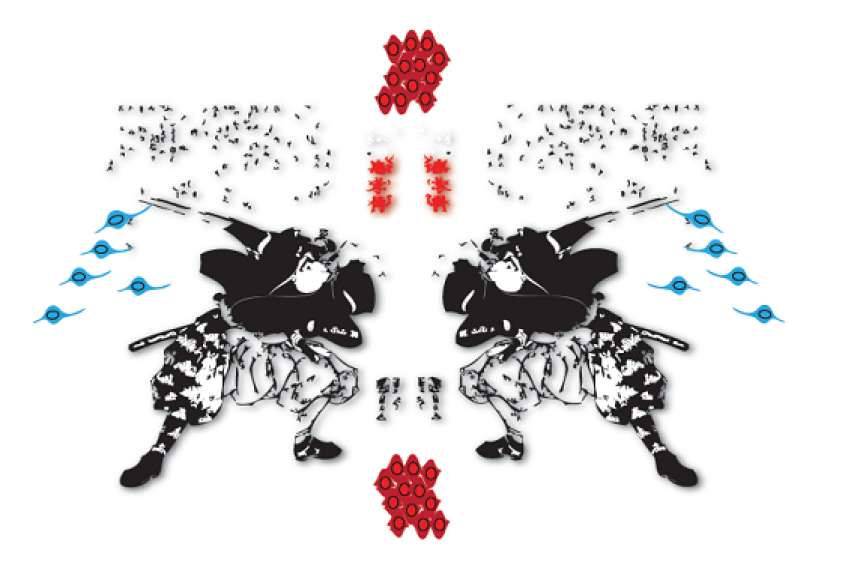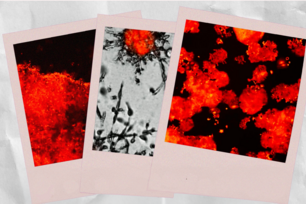
In Japanese, 'Musashi' means 'double-sworded,' and is also used in reference to the 17th Century Japanese Samurai. In this latest research, so-called Musashi proteins, which are overexpressed in several cancers, notably breast and lung cancer, were also found to contribute to a gene expression program that maintains an epithelial-luminal state in breast cancer.
Family of neural-associated RNA-binding proteins found to regulate cell state in breast cancer
CAMBRIDGE, Mass. – A widely conserved family of RNA-binding proteins known to be expressed in neural stem cells and other stem cell types has now been shown to play a role in controlling both the state and behavior of breast cancer cells.
In a paper published online this week in the journal eLife, a team of Whitehead Institute and MIT scientists reports that so-called Musashi (Msi) proteins are overexpressed in several cancers, notably breast and lung cancer. The team showed that in breast cancer, Msi proteins contribute to a gene expression program that maintains an epithelial-luminal state.
This somewhat surprising finding emerged from research that actually began as an investigation in the proteins’ role in neurobiology. Expression of the gene Msi1 is a marker of neural stem cells, but the gene is essentially unexpressed in the normal adult brain. Intriguingly, however, Msi1 was shown to be strongly upregulated in the brain cancer glioblastoma.
That association with malignancy prompted the scientists to study Msi gene activity in cancers outside the nervous system. Researchers cross-referenced expression data from The Cancer Genome Atlas—a large-scale NIH initiative that collects genomic data from patient tumor samples—with patient biopsies from tumor and healthy tissues, finding the protein Msi1 upregulated in roughly 40% of breast, lung, and prostate tumors and Msi2 highly expressed in breast and prostate tumors. While the Msi genes were upregulated in these cancers, they were not mutated, leading the team to believe that the abnormal activation of these proteins might be important for cancer cells.
Focusing on breast cancer, where tumor properties are well-defined by gene expression profiles, the researchers found that Msi protein expression was associated with breast cancer cells in an epithelial-luminal state. Expression of these genes was highest in an aggressive form of breast cancer tumors, known as “Luminal B” tumors. During cancer progression, cells often change state. Among the most important changes is the epithelial-to-mesenchymal transition, or EMT, during which cells shift from the relatively immobile epithelial state to the motile mesenchymal state. Because EMT in cancer cells is thought to promote tumor invasion and metastasis, the scientists wondered whether Msi proteins might affect EMT. They discovered that suppression of Msi proteins caused cells to lose their epithelial identity and assume the properties of mesenchymal cells. Conversely, Msi overexpression in mesenchymal cells induced epithelial-like properties, hindering the cells’ ability to migrate.
“This was definitely a surprise,” says Yarden Katz, a former graduate student in the lab of Whitehead Founding Member Rudolf Jaenisch and first author of the eLife paper. “We started out looking at the roles of these genes in neural development and wound up studying EMT and breast cancer.”
The EMT program, thought to be co-opted by cancer cells, is also a normal developmental process, so it was important validation for the scientists to find that overexpression of Msi2 prevented formation of a proper ductal system—a process that invokes EMT—in healthy mammary gland tissue.
For Katz, now a postdoctoral researcher at Broad Institute, and colleagues from the lab of MIT biology professor Christopher Burge, the next question was obvious: How exactly do the Musashi proteins exert their effects on cell state? Comprehensive ribosome profiling and RNA sequencing revealed that Msi proteins regulate gene translation. In one specific case, they found that Msi proteins can repress the translation of a gene that controls a cellular signaling pathway essential for EMT. The finding begins to establish a model for the manner in which post-transcriptional regulators affect cellular processes under normal and malignant conditions.
“Cancer cells can be found in very different states, and we want to understand the molecular players that can push cells from one state to another. A lot is known about transcription factors controlling cell state, but the role of RNA-binding proteins is much less clear,” Katz says.
For Jaenisch, the research represents an important addition to a growing body of knowledge in the field.
“The role RNA-binding proteins is a complicated issue, but it’s a topic of great interest,” says Jaenisch. “This is a very solid study that brings a little bit of clarity to the space.”
This work was supported by the National Institutes of Health (grants R01-GM096193, RO1-CA084198, and R01-GM085319), a National Science Foundation Graduate Research Fellowship (Grant No. 1122374), an Alfred P. Sloan fellowship, the National Basic Research program of China, the National Natural Science Foundation of China, and the National Transgenic Breeding Project of China.
* * *
Rudolf Jaenisch's primary affiliation is with Whitehead Institute for Biomedical Research, where his laboratory is located and all his research is conducted. He is also a professor of biology at Massachusetts Institute of Technology.
* * *
Citation:
Katz, Y., Li, F., Lambert, N. J., Sokol, E. S., Tam, W., Cheng, A. W., . . . Burge, C. B. (2014). Musashi proteins are post-transcriptional regulators of the epithelial-luminal cell state. ELife, 3. doi:10.7554/elife.03915
Topics
Contact
Communications and Public Affairs
Phone: 617-452-4630
Email: newsroom@wi.mit.edu


